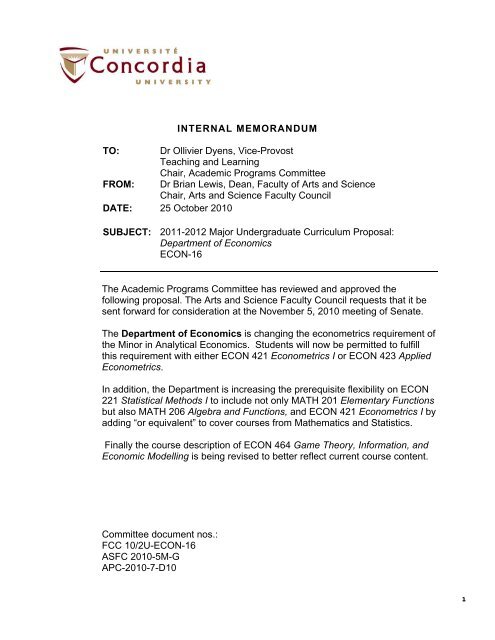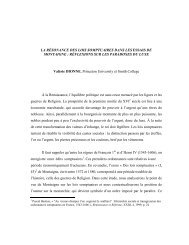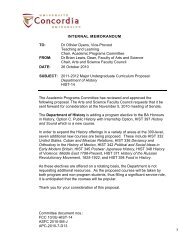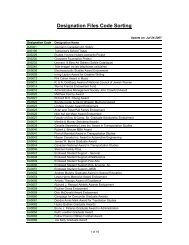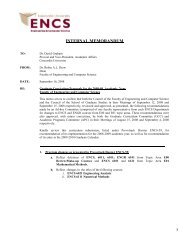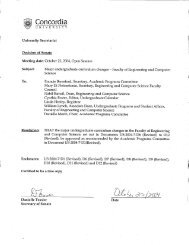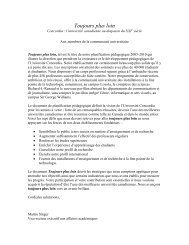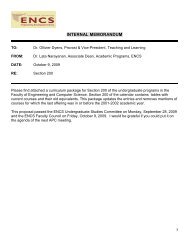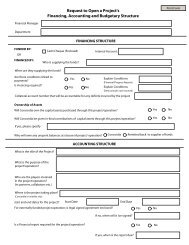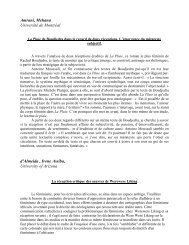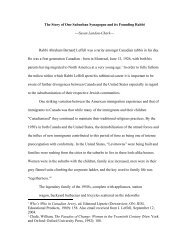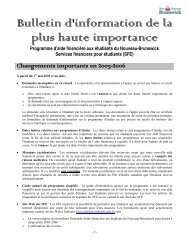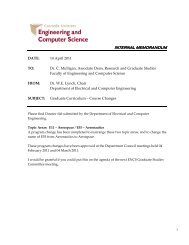INTERNAL MEMORANDUM TO: Dr Ollivier Dyens, Vice-Provost ...
INTERNAL MEMORANDUM TO: Dr Ollivier Dyens, Vice-Provost ...
INTERNAL MEMORANDUM TO: Dr Ollivier Dyens, Vice-Provost ...
- No tags were found...
You also want an ePaper? Increase the reach of your titles
YUMPU automatically turns print PDFs into web optimized ePapers that Google loves.
<strong>INTERNAL</strong> <strong>MEMORANDUM</strong><br />
<strong>TO</strong>: <strong>Dr</strong> <strong>Ollivier</strong> <strong>Dyens</strong>, <strong>Vice</strong>-<strong>Provost</strong><br />
Teaching and Learning<br />
Chair, Academic Programs Committee<br />
FROM: <strong>Dr</strong> Brian Lewis, Dean, Faculty of Arts and Science<br />
Chair, Arts and Science Faculty Council<br />
DATE: 25 October 2010<br />
SUBJECT:<br />
2011-2012 Major Undergraduate Curriculum Proposal:<br />
Department of Economics<br />
ECON-16<br />
The Academic Programs Committee has reviewed and approved the<br />
following proposal. The Arts and Science Faculty Council requests that it be<br />
sent forward for consideration at the November 5, 2010 meeting of Senate.<br />
The Department of Economics is changing the econometrics requirement of<br />
the Minor in Analytical Economics. Students will now be permitted to fulfill<br />
this requirement with either ECON 421 Econometrics I or ECON 423 Applied<br />
Econometrics.<br />
In addition, the Department is increasing the prerequisite flexibility on ECON<br />
221 Statistical Methods I to include not only MATH 201 Elementary Functions<br />
but also MATH 206 Algebra and Functions, and ECON 421 Econometrics I by<br />
adding “or equivalent” to cover courses from Mathematics and Statistics.<br />
Finally the course description of ECON 464 Game Theory, Information, and<br />
Economic Modelling is being revised to better reflect current course content.<br />
Committee document nos.:<br />
FCC 10/2U-ECON-16<br />
ASFC 2010-5M-G<br />
APC-2010-7-D10<br />
1
Department of Economics<br />
Memo from the Undergraduate Program Director<br />
Program Change<br />
Minor in Analytical Economics<br />
Prerequisite Changes<br />
ECON 221 3 Statistical Methods I<br />
ECON 421 3 Econometrics I<br />
Course Description and Note Change<br />
ECON 464 3 Game Theory, information, and Economic Modelling<br />
2
<strong>INTERNAL</strong> <strong>MEMORANDUM</strong><br />
<strong>TO</strong>:<br />
FROM:<br />
Joanne Locke, <strong>Vice</strong> Dean curriculum<br />
Carol Lau, Director Economics Undergraduate Program<br />
DATE: September 16, 2009<br />
SUBJECT: Curriculum Changes 2011-12<br />
Re: Curriculum Changes<br />
We would like to submit the following departmentally-approved changes for our program.<br />
Economics 464:<br />
The description better reflects the course content.<br />
Analytical Economics Minor: Students can take Econ 421 or Econ 423 as their<br />
econometrics requirement. Either is sufficient.<br />
Prerequisites have been broadened for ECON 221 and ECON 421 for easier access.<br />
3
PROGRAM AND COURSES CHANGE FORMS FOR DOCUMENT: ECON-16 VERSION: 2<br />
PROGRAM CHANGE: Minor in Analytical Econ<br />
Proposed [X] Undergraduate or [ ] Graduate Curriculum changes<br />
Calendar for academic year: 2011/2012<br />
Implementation Month/year: September 2011<br />
Faculty/School:<br />
Arts and Science<br />
Department:<br />
Economics<br />
Program:<br />
Arts & Science<br />
Degree:<br />
Economics<br />
Calendar Section/Graduate Page Number:31.080<br />
Type of Change:<br />
[ ] Editorial<br />
[ ] New Program<br />
[X] Requirements [ ] Regulations [ ] Program Deletion<br />
Present Text (from 2010/2011) calendar<br />
24 Minor in Analytical Economics<br />
NOTE: MATH 203 or 209; MAST 221; or equivalent are prerequisites<br />
for this program. ECON 201, 203, and 325 are waived as<br />
prerequisites only for those courses which are taken as part of the<br />
Minor.<br />
3 ECON 222 3<br />
12 ECON 301 3 , 302 3 , 303 3 , 304 3<br />
3 Chosen from ECON 318 3 , 319 3<br />
3 ECON 324 3<br />
3 ECON 423 3<br />
NOTE: This program is intended for students in Science,<br />
Mathematics/Statistics, or Engineering.<br />
Proposed Text<br />
24 Minor in Analytical Economics<br />
NOTE: MATH 203 or 209; MAST 221; or equivalent are prerequisites<br />
for this program. ECON 201, 203, and 325 are waived as<br />
prerequisites only for those courses which are taken as part of the<br />
Minor.<br />
3 ECON 222 3<br />
12 ECON 301 3 , 302 3 , 303 3 , 304 3<br />
3 Chosen from ECON 318 3 , 319 3<br />
3 ECON 324 3<br />
3 Chosen from ECON 421 3 , 423 3<br />
NOTE: This program is intended for students in Science,<br />
Mathematics/Statistics, or Engineering.<br />
Rationale: As is the case with students in the specialization in Economics, students in the Minor are permitted to fulfill the econometrics requirement with either ECON 421<br />
Econometrics I or ECON 423 Applied Econometrics.<br />
Resource Implications: None<br />
4<br />
D1
PROGRAM AND COURSES CHANGE FORMS FOR DOCUMENT: ECON-16 VERSION: 2<br />
COURSE CHANGE: ECON 221<br />
New Course Number:<br />
Proposed [X] Undergraduate or [ ] Graduate Curriculum changes<br />
Calendar for academic year: 2011/2012<br />
Implementation Month/year: September 2011<br />
Faculty/School:<br />
Arts and Science<br />
Department:<br />
Economics<br />
Program:<br />
Degree:<br />
Calendar Section/Graduate Page Number:31.080<br />
Type of Change:<br />
[ ] Course Number<br />
[ ] Course Description<br />
[ ] Course Deletion<br />
[ ] Course Title<br />
[ ] Editorial<br />
[ ] Other - Specify:<br />
[ ] Credit Value<br />
[ ] New Course<br />
[X] Prerequisite<br />
Present Text (from 2010/2011) calendar<br />
Proposed Text<br />
ECON 221 Statistical Methods I (3 credits)<br />
Prerequisite: Cegep Mathematics 311 or MATH 201. This course<br />
examines elementary probability, permutations and combinations,<br />
binomial and normal distribution, as well as analysis and<br />
organization of economic data, tests of hypotheses, confidence<br />
limits, introduction into linear regression and correlation with<br />
applications to economics.<br />
NOTE See §200.7<br />
ECON 221 Statistical Methods I (3 credits)<br />
Prerequisite: Cegep Mathematics 311 or MATH 201 or 206. This course<br />
examines elementary probability, permutations and combinations,<br />
binomial and normal distribution, as well as analysis and<br />
organization of economic data, tests of hypotheses, confidence<br />
limits, introduction into linear regression and correlation with<br />
applications to economics.<br />
NOTE See §200.7<br />
Rationale: Both MATH 201 Elementary Functions and MATH 206 Algebra and Functions provide the necessary background for ECON 221.<br />
Resource Implications: None<br />
Other Programs within which course is listed:<br />
5<br />
D2
PROGRAM AND COURSES CHANGE FORMS FOR DOCUMENT: ECON-16 VERSION: 2<br />
COURSE CHANGE: ECON 421<br />
New Course Number:<br />
Proposed [X] Undergraduate or [ ] Graduate Curriculum changes<br />
Calendar for academic year: 2011/2012<br />
Implementation Month/year: September 2011<br />
Faculty/School:<br />
Arts and Science<br />
Department:<br />
Economics<br />
Program:<br />
Degree:<br />
Calendar Section/Graduate Page Number:31.080<br />
Type of Change:<br />
[ ] Course Number<br />
[ ] Course Description<br />
[ ] Course Deletion<br />
[ ] Course Title<br />
[ ] Editorial<br />
[ ] Other - Specify:<br />
[ ] Credit Value<br />
[ ] New Course<br />
[X] Prerequisite<br />
Present Text (from 2010/2011) calendar<br />
Proposed Text<br />
ECON 421 Econometrics I (3 credits)<br />
Prerequisite: ECON 324, 326. This course develops the simple and<br />
multiple classical regression models. The problems of mis-specified<br />
structures, multi-collinearity, and forecasting are also presented.<br />
ECON 421 Econometrics I (3 credits)<br />
Prerequisite: ECON 324, 325 or equivalent. This course develops the<br />
simple and multiple classical regression models. The problems of<br />
mis-specified structures, multi-collinearity, and forecasting are<br />
also presented.<br />
Rationale:<br />
Instructors of this course consider Economics 325 sufficient as a pre-requisite for Econ 421. Because this Minor is oriented to<br />
students with solid mathematical skills, many students in the Minor will have taken equivalent courses to ECON 325 such as MAST 234,<br />
MATH 251 or higher.<br />
Resource Implications: None<br />
Other Programs within which course is listed:<br />
6<br />
D3
PROGRAM AND COURSES CHANGE FORMS FOR DOCUMENT: ECON-16 VERSION: 2<br />
COURSE CHANGE: ECON 464<br />
New Course Number:<br />
Proposed [X] Undergraduate or [ ] Graduate Curriculum changes<br />
Calendar for academic year: 2011/2012<br />
Implementation Month/year: September 2011<br />
Faculty/School:<br />
Arts and Science<br />
Department:<br />
Economics<br />
Program:<br />
Degree:<br />
Calendar Section/Graduate Page Number:31.080<br />
Type of Change:<br />
[ ] Course Number<br />
[X] Course Description<br />
[ ] Course Deletion<br />
[ ] Course Title<br />
[ ] Editorial<br />
[ ] Other - Specify:<br />
[ ] Credit Value<br />
[ ] New Course<br />
Note deletion.<br />
[ ] Prerequisite<br />
Present Text (from 2010/2011) calendar<br />
Proposed Text<br />
ECON 464 Game Theory, Information, and Economic Modelling<br />
(3 credits)<br />
Prerequisite: ECON 222, 302, 304. This course covers topics in<br />
non-cooperative game theory and information economics such as<br />
dominance, Nash equilibrium, subgame perfection, repeated games,<br />
bayesian equilibrium, sequential equilibrium, signalling,<br />
bargaining, auctions, moral hazard, adverse selection, and<br />
bounded rationality. The course focuses on applications, such as<br />
auditing games, nuisance suits, product quality, lemons models,<br />
entry deterrence, insurance models, winner’s curse, innovation<br />
and patent races.<br />
NOTE: Students who have received credit for this topic under an<br />
ECON 498 number may not take this course for credit.<br />
ECON 464 Game Theory, Information, and Economic Modelling (3 credits)<br />
Prerequisite: ECON 222, 302, 304. This introductory course on game<br />
theory is a collection of mathematical tools to model and analyze<br />
strategic interactions in a variety of settings, from economic and<br />
social situations to politics and international relations. The course<br />
focuses on both non-cooperative and cooperative game theoretic<br />
modelling, in particular, strategic and extensive form games,<br />
Bayesian games, and coalitional games. Students learn to solve games<br />
using the concepts of dominant strategies, Nash-equilibrium, subgame<br />
perfection, Bayesian equilibrium, and the core. Applications may<br />
include repeated games, auctions, bargaining, oligopoly games, entry<br />
deterrence, pricing strategies, and collusion.<br />
Rationale:<br />
The changes in the course description involve minor updating of content.<br />
topic under an ECON 498 number has not been offered in over 5 years.<br />
The description better reflects the course content. This<br />
Resource Implications: None<br />
Other Programs within which course is listed:<br />
None<br />
7<br />
D4


